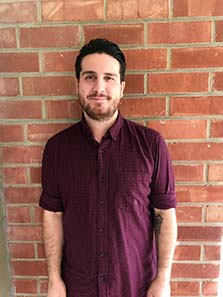
Pathways to Climate Action: from English to the Sciences
Danilo Caputo, Ph.D. Candidate, English
Editor's note: This is a quarterly article feature spotlighting a current graduate student undertaking a project that extends beyond the traditional lines of his or her discipline, utilizing a variety of skills to solve a pressing problem or answer a challenging question.At the outset, I wasn't sure what, if anything, would be gained by participating in UCI's Climate Action Training Program. Sure, I viewed climate action as a non-academic interest that I was passionate about, but I also kept it separate from what I do as a graduate student who works primarily with English literature of the early modern period. So seeing how this training would advance my academic career was, to say the least, unclear. Biologists, law students, engineers, and other grad students from disciplines outside of the humanities did not seem like the most sensible peer group, and meeting weekly with them to discuss climate science and policy didn't appear to be the best use of my time. And how could reading the Fifth Assessment Report from the Intergovernmental Panel on Climate Change help me pass my qualifying exams? Shouldn't I be attending academic conferences rather than lobbying for climate action in Washington, D.C.? Doesn't an internship with the Humanities Commons make more sense than one with the Sustainability Initiative? Furthermore, if what I stood to gain from this experience seemed uncertain, what I had to offer was even more so; what could I possibly contribute to discussions of cap-and-trade, geoengineering, and ocean acidification? Quotes from Shakespeare, Spenser, and Milton?
Yes, I had my reservations. But I'm glad that I ultimately decided not to let them deter me from becoming a Climate Action Fellow. My yearlong tenure in the program has been a wonderfully productive, enriching, and worthwhile experience. Not only am I a better, more informed advocate for climate action—now I see pathways for applying what I've learned both from within and beyond the academy.
My training included enrollment in a course on climate change policy in the Law School. It was here that I worked on a final project that would ultimately become the curriculum for my Writing 39C classes. As my composition students develop their research and argumentation skills, they are also introduced to climate change as a social justice issue and are exposed to the ways various disciplines approach this problem; by the end the quarter, they will written research papers advocating for solutions to a range of climate change-related issues. Additionally, working as a Graduate Student Researcher for the Sustainability Initiative, specifically on its Regional Climate Resilience Project, has influenced my scholarship: I wrote a report on the history of the term "resilience" and its uses across disciplines—including ecology, psychology, and engineering—and this report has become the conceptual framework for my dissertation on literary depictions of resilience in early modern England. If I hadn't enrolled in the Climate Action Training Program, I would never have developed what are now the most salient features of my academic work.
Being a Climate Action Fellow was not only beneficial to my teaching and scholarship. Working outside of the humanities has helped me recognize possibilities beyond the academy. My initial doubts about my what I had to offer to a group of scientists and law students were quickly dispelled as I found myself becoming a mediator between the two. Indeed, one of the greatest barriers to climate action stems from a disconnect between science and policy, and I believe that we in the humanities are uniquely equipped to close the gap. My education in the humanities has given me the ability to recognize the rhetorical situation of any circumstance and to utilize the the best means for effective communication. I've also been taught to value objectivity, empathy, and courtesy, things that are often taken for granted (or completely ignored) when they are most critical—not when we are communicating within our disciplines, but across them. Recognizing and translating discursive practices across disciplines to create open and clear channels for communication is vital to the success of large-scale climate action, and this is the role I decided to take on as a Climate Action Fellow. As such, I became a point person in discussions within our cohort, when we were meeting with advocacy groups, and in congressional offices when we were lobbying for climate action on Capitol Hill. My belief about the important roles humanists can play outside of academia were confirmed while we were sitting in a meeting with members of the American Academy for the Advancement of Science (AAAS) in its D.C. offices. When I introduced myself as an English graduate student they looked surprised, then curious. When I told them that, among other things, I teach undergraduates—largely STEM majors—how to conduct research and write about climate science and policy in clear and compelling language, they lit up. They told me this is one of the issues that they themselves were trying to address and wanted to hear more about what I do. By the end of the meeting, each AAAS member had given me their card and asked if I was interested in applying for a fellowship. Although I intend to stay within the academy by completing my PhD and becoming a professor, it's good to know that there are other, less obvious (but no less interesting or fulfilling) pathways to pursue with a humanities degree; you just need to be open and willing to explore them. If a Shakespeare scholar can end up at AAAS, then the possibilities for humanities majors are truly infinite.
